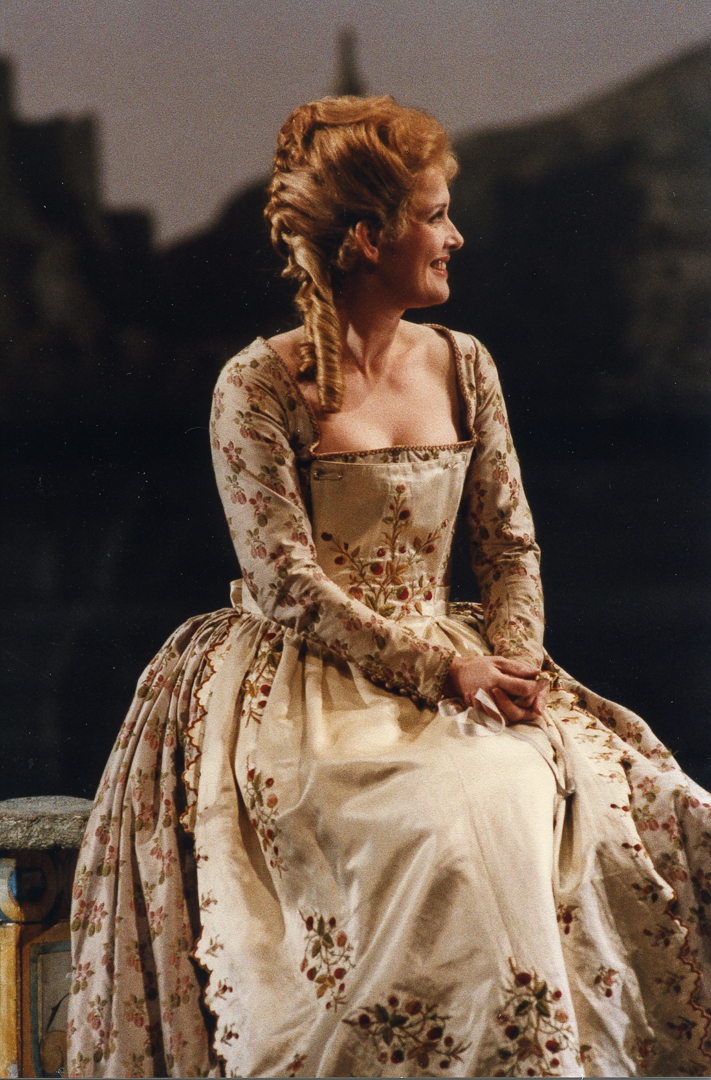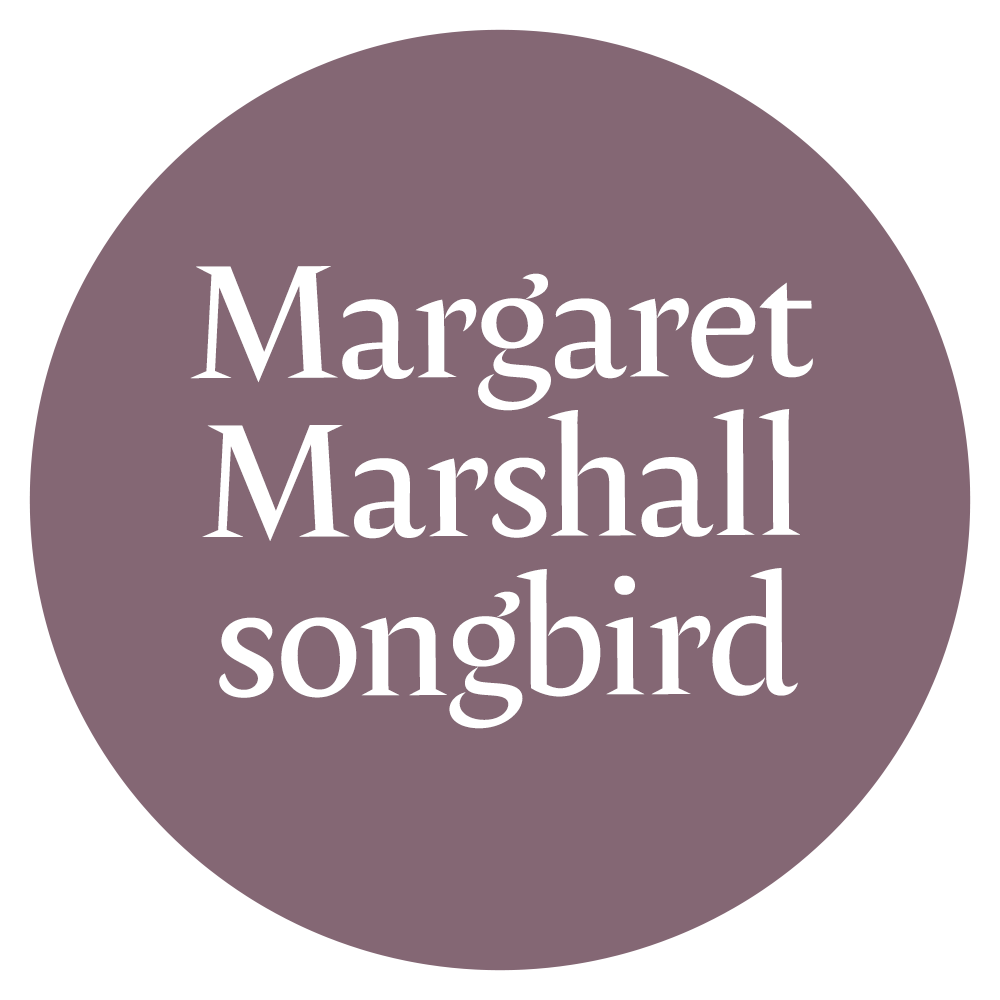Biography

Margaret Marshall OBE, Soprano
Margaret Marshall was born in Stirling, Scotland in 1949. After leaving school, Margaret had a choice between an offer to study languages at St Andrews University or singing at the Royal Scottish Academy of Music and Drama. Singing won and Margaret set out on a musical path which saw her become one of Scotland’s most successful singers on the international stage.
It was at the Royal Scottish Academy that Margaret met her teacher Ena Mitchell, with whom she continued to study after graduating. Winning a Caird travelling scholarship, Margaret also travelled to Munich to study with the renowned German bass-baritone Hans Hotter. It was he who suggested that Margaret enter the 1974 ARD International Music Competition in Munich.
Winning first prize, singing Purcell and Bach in the final, launched an international career that initially focussed on the concert platform. In 1975 she made her recital debut at the Wigmore Hall. In 1975 she made her Festival Hall debut singing in JS Bach’s St Matthew Passion. She made her first recording with Rudolf Ewerhardt singing JC Bach Salve Regina and Galuppi Rapida Cerva. She then participated in the series of recordings of Vivaldi’s complete sacred vocal music with the English Chamber Orchestra conducted by Vittorio Negri. She also recorded Bach’s B Minor Mass with Neville Marriner and the Academy of St Martin in the Fields.
Her first operatic role was Euridice in Gluck’s Orfeo which she first sang on the concert platform in the Queen Elizabeth Hall with John Eliot Gardiner before making her stage debut in Florence with Riccardo Muti in 1977, a role she subsequently recorded with Muti and the Philharmonia Orchestra. The Italian conductor invited her back to Florence for his first Le Nozze di Figaro in 1979, in which she sang the role of the Countess.
On the opera platform, Margaret was perhaps best known for her interpretation of Mozartian roles. She sang the Countess in Figaro in many of the world’s leading opera houses including the Royal Opera House London, La Scala Milan, the Wiener Staatsoper and the Deutsche Oper Berlin as well as with Scottish Opera. She made her Salzburg Festival debut in 1982 singing Fiordiligi in Cosi fan Tutte with Riccardo Muti and the Vienna Philharmoniker in Michael Hampe’s acclaimed production that remained a festival favourite until 1991. She also recorded the role with Muti and the Vienna Philharmonic. Other opera houses in which she sang Fiordiligi include the Royal Opera House, Frankfurt Opera, Zurich Opera and Scottish Opera.
Other Mozart roles Margaret sang include Pamina (Zauberflote), Vitellia (La Clemenza di Tito), Ilia (Idomeneo), Arminda (La Finta Giardiniera); Donna Elvira and Donna Anna (Don Giovanni). Other roles include Violetta (La Traviata), the Marschallin (Rosenkavalier), the Countess (Capriccio), Lucio (Tito Manlio), and Hypernmestre (Salieri Les Danaides).
Margaret continued to be much in demand as a concert singer in addition to her many operatic roles, singing with many of the world’s most renowned orchestras and conductors. She sang with the Berlin Philharmonic, the Vienna Philharmonic, the Vienna Symphony Orchestra, the Bayerische Rundfunk Orchester, the London Philharmonic, the London Symphony Orchestra, the Philharmonia Orchestra, the Academy of St Martin in the Fields, the Scottish National Orchestra, the Scottish Chamber Orchestra, the Orchestre de Paris, the New York Philharmonic, the Boston Philharmonic, the Philadelphia Orchestra, the Chicago Symphony Orchestra and the Dallas Symphony Orchestra. Conductors she regularly performed with include Claudia Abbado, Riccardo Muti, Sir Neville Marriner, Carlo-Maria Giulini, John Elliot Gardiner, Bernard Haitink, Daniel Barenboim, Zubin Mehta, Christian Thielemann, Sir Alexander Gibson, Sir Charles Groves, Sir Adrian Boult, Jeffrey Tate, Michael Gielen, Gary Bertini, Vittorio Negri, and Georg Fischer
She excelled in baroque music, where her repertoire included Bach B Minor Mass, St Matthew Passion, St John Passion, Jauchzett Gott and many other cantatas; Handel’s Messiah, Jeptha and Dixit Dominus. She recorded the St Matthew Passion with Michael Corboz and the Lausanne Chamber Orchestra, Jeptha with Sir Neville Marriner and the Acadamy of St Martin in the Fields, the Messiah and Dixit Dominus both with Sir John Elliot Gardiner and the English Baroque Soloists, Bach B Minor Mass with Sir Neville Marriner and Pergolesi Stabat Mater with Claudio Abbado.
Other composers in her concert repertoire include Beethoven (Missa Solemnis), Berlioz (Beatrice and Benedict), Brahms (A German Requiem), Britten (Rape of Lucretia, War Requiem), Bruckner (F Minor Mass), Elgar (The Kingdom), Haydn (the Creation, Nelson mass) Mozart (C minor mass, Coronation Mass, Exultate Jubilate, Davide Penitente, Requiem, numerous concert arias); Mahler (Symphony 4, Symphony 8), Mendelssohn (Midsummer Night’s Dream, Elijah, Paulus); Strauss (Four last songs, numerous lieder), Tippett (A Child of our Time); and Vaughan Williams (A Sea Symphony).
She has recorded much of this work including Mozart C minor mass, Haydn Creation, Mahler
Symphonies 4 and 8, Elgar the Kingdom and Vaughn Williams Sea Symphony.
Margaret received an OBE for services to music in 1999. She also received the James Gulliver Award for Performing Arts in Scotland in 1991. She retired from professional singing in 2004. In 2009 she received an honorary doctorate from the University of St Andrews. She now lives in the South of France and is very active in encouraging her two young granddaughters, Maddie and Evie, to appreciate the joys of music.
